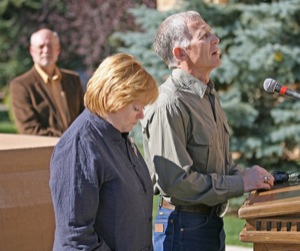-
- Court makes Conn. third state to allow same-sex marriage
- Same-sex marriage ban attracts big money in California
- Mormons recruit out-of-state for same-sex marriage ban
- 10 years after Shepard, no federal hate crime law
- U.S. gay candidates expect Election Day breakthrough
- Ark. plans to drop unmarried foster parent ban
- National News Briefs
- World News Briefs
national
10 years after Shepard, no federal hate crime law
Wyoming one of five states with no hate crime law
Published Thursday, 16-Oct-2008 in issue 1086
CHEYENNE, Wyo. (AP) – Matthew Shepard’s mother still mourns lost opportunities to battle hate crimes and promote a greater tolerance of gays and lesbians in the 10 years since her 21-year-old son was beaten, tied to a wooden fence and left for dead in a frigid Wyoming pasture.
Though Congress has not passed a federal hate crime law, Judy Shepard is buoyed by enhanced punishments for crimes based on sexual orientation in 31 states and the District of Columbia.
“Ten years have gone by and not that much has changed, and I think that’s just really disappointing,” said Shepard, who with her husband formed the Matthew Shepard Foundation to promote equality for the GLBT community.
“We passed up a golden opportunity to set things in motion and make a change and set an example and let it go,” she said.
In a case that outraged GLBT activists and their advocates around the country, Matthew Shepard died Oct. 12, 1998, five days after he was kidnapped, robbed and pistol-whipped by two men he met in a bar. Both men are serving life in prison for the murder, which police said was partly motivated by the fact that Matthew was gay.
Matthew’s death after he was left in the cold – bloodied with severe head injuries – for 18 hours has produced an outpouring of films, books and plays, but it hasn’t seemed to budge the rate of anti-gay violence.
FBI statistics show hate crimes motivated by anti-gay bias have remained at a stable level since Matthew’s death. Both in 1998 and in 2006, the latest year for which data is available, roughly 1,200 such crimes were reported – about 16 percent of all reported hate crimes.
Matthew’s mom has other disappointments on her list: The lack of a federal hate crime law; state laws restricting marriage to heterosexual couples; discrimination against gays and lesbians in the workplace; and the government’s refusal to grant same-sex couples the benefits afforded straight couples.
“What’s OK about that?” Shepard asked. “Nothing.”
Generally, hate crime laws enhance penalties for bias-motivated crimes, increase funding for the investigation of such crimes or require better record-keeping. Wyoming is among five states – along with Arkansas, Georgia, Indiana, South Carolina – that don’t have any type of hate crime law. Fourteen states have adopted hate crime laws that don’t cover sexual orientation or gender identity, according to the Human Rights Campaign, a Washington, D.C.-based group that promotes equality for gay, lesbian, bisexual and transgender people.
Proponents have pushed for federal action for the past 10 years, coming closest last year when measures to expand the definition of hate crimes to cover sexual orientation passed both houses of Congress. The proposals ultimately fell short, partly because of a veto threat by President Bush.
Under current federal law, hate crimes apply to acts of violence against individuals on the basis of race, religion, color or national origin. Federal prosecutors would have jurisdiction only if the victim is engaged in a specific federally protected activity such as voting.
The bill that passed the U.S. House last year would have extended the hate crime category to include sexual orientation, gender, gender identity or disability. It also would have given federal authorities greater leeway to participate in hate crime investigations and provided $10 million over two years to help local law enforcement officials cover the cost of hate crime prosecutions.
The U.S. Senate version, dubbed the Matthew Shepard Act, was attached to a spending bill for the Iraq war. Sixty Senators voted to support the amendment, but the legislation was later dropped by the House because of its attachment to the defense policy bill.
The White House argued that state and local laws already covered the new crimes defined under the House version of the bill and there was “no persuasive demonstration of any need to federalize such a potentially large range of violent crime enforcement.”
Joe Solmonese, president of the Human Rights Campaign, said it was a victory to get a hate crime bill passed in both chambers. He’s hopeful for greater success with the next Congress and a new administration. Democratic presidential nominee Sen. Barack Obama has committed to signing such a bill, while Republican nominee Sen. John McCain has yet to support it, Solmonese said.
Shepard, meanwhile, travels away from her home in Casper about six months of the year for her work with the foundation. Despite legal and legislative obstacles for gays, she believes American society has made strides over the past 10 years in accepting the GLBT community.
“Socially, we’ve made really, really great progress in educating the general public about gay and lesbian issues, so I feel really good about that,” Shepard said.
She’s hopeful the November election will usher in leaders who will pass federal hate crimes legislation.
“We’re going to have a new president, whoever that may be, and new members of Congress, new senators, hopefully with open minds and open hearts, who have a better understanding of the gay community,” Shepard said. “It’s not of matter of if, it’s a matter of when.”
|
|
Copyright © 2003-2025 Uptown Publications


